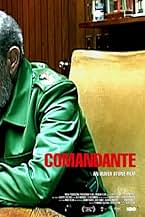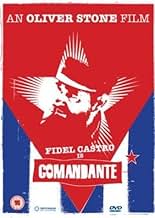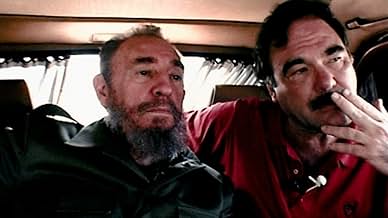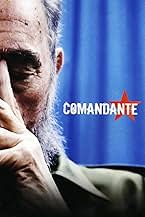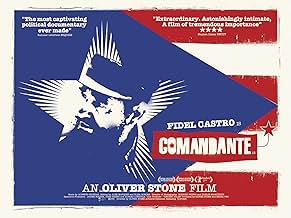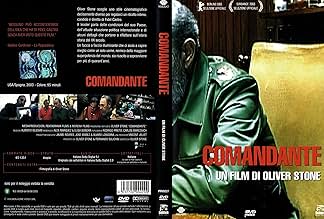Comandante
- 2003
- Tous publics
- 1h 39min
NOTE IMDb
6,9/10
4 k
MA NOTE
Ajouter une intrigue dans votre langueDocumentary on the director's meeting with Castro.Documentary on the director's meeting with Castro.Documentary on the director's meeting with Castro.
Ernesto 'Che' Guevara
- Self
- (images d'archives)
John F. Kennedy
- Self
- (images d'archives)
Richard Nixon
- Self
- (images d'archives)
Janet Reno
- Self
- (images d'archives)
Jaume Roures
- Self
- (non crédité)
Santiago Segura
- Self
- (non crédité)
Avis à la une
In communism/socialism the beginning is always the End. One dictator removes another from power by force. Many praise the men that at the moment believe what they fight for some kind of change, usually when the previous government has been corrupt in some way. Corruption creates poverty and poverty leads to stress then becomes the fuel for a revolution. Most revolutions in our history have lead to totalitarianism. I like to blame that on human nature the USA is not perfect but its pretty close if you do not know what it's like to live in Cuba don't be mistaken tourist don't see the suffering especially if you have the money. Venezuela is a fresh look on early Cuba lets see how its ends up in a few years. HUGO CHAVEZ and some fanatics are beginning to dismantle any checks and balances the country may have plans on changing how long he can serve as president no limit remind you of something. Enough about that after so many years and tears and lives lost at sea. The exiled Cubans have preserved peace by leaving through 90 miles of rough seas on anything that floats not recreating another revolt adding to the cycle of bull in almost 40 odd years. Thousands of lives lost at sea as well as injustices on that prisoner island. Please think why would so many people risk their lives in such a way.
Despite the anti-Castro rhetoric that has been going on in this country since the 1960's, this film has managed to make its way to the mainstream media of the most hostile nation towards Cuba. This documentary gives us a view at Cuba's Fidel Castro. Castro has been one of the most talked about leaders this century and has managed to "control" or stay in power more than any other head of state alive today. Demonized and admired by millions worldwide, Castro is seen as he is today, an aged man with stories and anecdotes that would require volumes to ever capture on film. I highly suggest viewing this film, regardless of you political persuasion. For those who view Castro as a revolutionary , the always active and still brilliant way that he answers some of Stone's toughest questions, this film will probably further your admiration in this charismatic figure. For those who view him as a ruthless dictator, you might see this film as a bit soft. Stone does not insult him or complicate him, at least not to a level that Castro can not handle. Maybe it is the fact that this documentary shows a human being and not our common image of a communist on the quest for power.
I just saw Comandante on Greek public television, in its entirety and uninterrupted and was immediately drawn to it.
Whether one agrees with Cuba's political system or not, is not the issue here. What Oliver Stone has achieved is what no journalist or historian has ever come close to. He brings himself and his crew right up close to the aged leader and confronts him relentlessly with questions from the mundane to the esoteric and from the political to the personal. Ideas about the past and the future, about dreams, art, democracy, colonialism, family, religion, women's rights, education, love etc are all exposed here, bringing out an intimate portrait. The questions are often uncomfortable as when Stone asks Castro about his ex wives in front of his wife, or when his claims about policing in Cuba are denied by one of Stone's crew members. Yet Castro even at this age, is sharp, humorous and poetic in a way that reveals the intellectual behind the politician.
It is also a travel documentary of Havana where Fidel Castro is Stone's guide and walks him through the city's monuments and cafés, sits next to him at the back seat of his car, eats and drinks with him and we get a sense that he knows what is happening in Havana's every alley.
One thing is for sure: no other country leader would ever allow himself the closeness Castro offers to Stone and expose his feelings and doubts with such spontaneity.
Stone turns a formal encounter into a family visit and brings the audience to meet an iconic political figure and spend a couple of intimate hours with him.
A work that leaves you thinking for a long while.
Whether one agrees with Cuba's political system or not, is not the issue here. What Oliver Stone has achieved is what no journalist or historian has ever come close to. He brings himself and his crew right up close to the aged leader and confronts him relentlessly with questions from the mundane to the esoteric and from the political to the personal. Ideas about the past and the future, about dreams, art, democracy, colonialism, family, religion, women's rights, education, love etc are all exposed here, bringing out an intimate portrait. The questions are often uncomfortable as when Stone asks Castro about his ex wives in front of his wife, or when his claims about policing in Cuba are denied by one of Stone's crew members. Yet Castro even at this age, is sharp, humorous and poetic in a way that reveals the intellectual behind the politician.
It is also a travel documentary of Havana where Fidel Castro is Stone's guide and walks him through the city's monuments and cafés, sits next to him at the back seat of his car, eats and drinks with him and we get a sense that he knows what is happening in Havana's every alley.
One thing is for sure: no other country leader would ever allow himself the closeness Castro offers to Stone and expose his feelings and doubts with such spontaneity.
Stone turns a formal encounter into a family visit and brings the audience to meet an iconic political figure and spend a couple of intimate hours with him.
A work that leaves you thinking for a long while.
10gavin-96
Watching recent documentaries from writers such as Michael Moore, one may be confused to what a documentary actually is. Comandante is a perfect example of what a documentary should be like. By the end of its running, the viewer has seen a balanced account with enough information either way to give food for thought.
I came away from this asking myself - 'is Castro a truly great man?', or is he 'full of ***t'?, or on the other hand has he just not practiced what he has preached?
Moore on the other hand comes from a journalistic angle, everything so over emphasised and dramatised, as if he is almost trying to convince the viewer to agree with him. He presents information through his own paradigm of the opinion he is carrying at the time.
Comandante is a mature documentary, flawless in presentation as Stones work generally is; but the key to its quality, is that it does not give you the answer. It documents the facts.
Comandante easily achieves what it sets out to do. Some viewers may expect more given the subject, but for the purist, satisfaction guaranteed.
I came away from this asking myself - 'is Castro a truly great man?', or is he 'full of ***t'?, or on the other hand has he just not practiced what he has preached?
Moore on the other hand comes from a journalistic angle, everything so over emphasised and dramatised, as if he is almost trying to convince the viewer to agree with him. He presents information through his own paradigm of the opinion he is carrying at the time.
Comandante is a mature documentary, flawless in presentation as Stones work generally is; but the key to its quality, is that it does not give you the answer. It documents the facts.
Comandante easily achieves what it sets out to do. Some viewers may expect more given the subject, but for the purist, satisfaction guaranteed.
Oliver Stone, probably one of the most relevant filmmakers of the last decades in the United States, has been trying to get the American public –one of the most ignorant and alienated populations among developed countries– into alternative sides of what in the USA has been called the "official story". Comandante is not an exception in that aim, and it may approach the viewers to some topics that big media corporations and the military-industrial complex have been boycotting through the years in order to avoid the public to ask their government about some big questions. Stone's filmography evidences his own interest in the last half of the recent century –the half he was born in and the events, after WW2, that bring the United States to become what we know today–, and the plots that –in his own words– diminished individual freedom and democratic values in "the land of the free and the home of the brave!" Position for which he has often been criticized "for promoting conspiracy theories and alleged historical inaccuracies." This documentary is an important effort, now that Fidel Castro –one of the 10 most influential politicians of the last century– is probably close to the end of his life. Some analysts have said that the 20th Century will have officially ended after Castro's death.
Le saviez-vous
- AnecdotesAt the beginning of the movie, when Stone and Castro are strolling through the corridors, you see Santiago Segura, dressed in white, standing in front of a group of people.
- ConnexionsFeatures Vatel (2000)
- Bandes originales11.11
Written and Performed by Paul Kelly
Meilleurs choix
Connectez-vous pour évaluer et suivre la liste de favoris afin de recevoir des recommandations personnalisées
- How long is Comandante?Alimenté par Alexa
Détails
Box-office
- Montant brut mondial
- 135 633 $US
- Durée
- 1h 39min(99 min)
- Couleur
- Mixage
Contribuer à cette page
Suggérer une modification ou ajouter du contenu manquant


